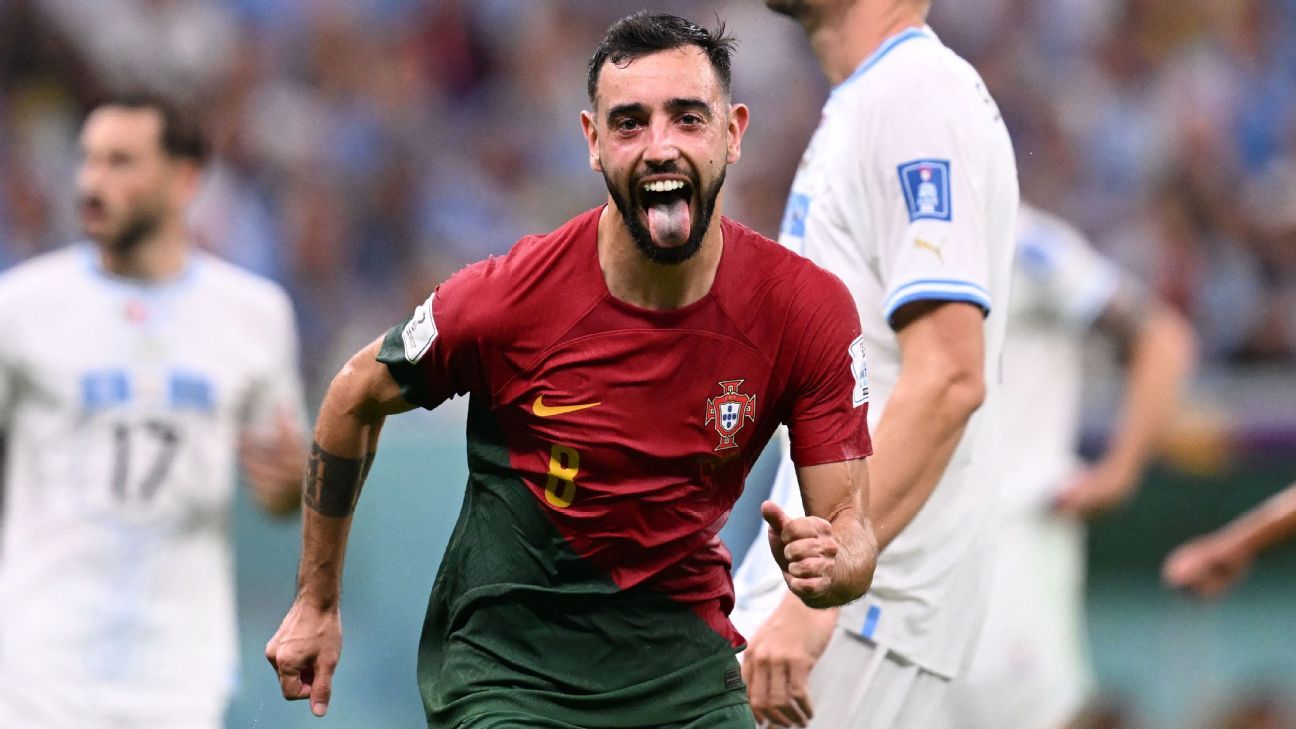DOHA, Qatar — A year-and-a-half is a long time in football, but particularly for Bruno Fernandes and his Portugal career.
– World Cup 2022: News and features | Bracket | Schedule | Squads
In June 2021, the Manchester United midfielder was dropped by coach Fernando Santos for their European Championship round-of-16 tie against Belgium, having played poorly during the group stage. Portugal lost 1-0 and crashed out.
Fast-forward to the World Cup and Santos is again preparing his team for a knockout game at a major tournament, against Switzerland at Lusail Stadium on Tuesday. But this time Fernandes’ participation isn’t up for debate. He scored two goals and registered two assists in the group stage and was rested for the final game against South Korea to save him for tougher tests to come.
Santos is often accused of not being able to make Portugal add up to the sum of their impressive parts but, in Qatar at least, Fernandes is doing his bit. A squad stacked with talents like Cristiano Ronaldo, Bernardo Silva, Joao Felix, Ruben Dias and Joao Cancelo heads into the knockout phase as something of an enigma — slick one minute, sloppy the next. They will need Fernandes to maintain his form to stand a chance of going past the round of 16 at a World Cup for the first time since reaching the semifinals in 2006.
Fernandes was heavily criticised during the Euros, with Jose Mourinho saying after a 4-2 defeat to Germany in the group stage that Fernandes was “on the pitch but not playing.” There have been questions at United, too — despite scoring 53 goals in 146 games since arriving from Sporting CP in January 2020 in a deal worth up to €80 million — with most centring on his tendency to give the ball away.
In a Champions League match against Istanbul Basaksehir in November 2020, statistics showed that he surrendered the ball 34 times as United lost 2-1. A few weeks later he gave the ball away 17 times — the most of any player on the pitch — in a Premier League game against Wolves, but this time it was his pass which set up a 90th-minute winner for Marcus Rashford.
Then-manager Ole Gunnar Solskjaer admitted afterward that Fernandes sometimes made him want to “tear his hair out” but insisted that, to get the best out of him, you have to take the good with the bad.
“He is definitely a player who impacts results,” Solskjaer said. “He creates chances, scores goals and takes risks, which any Manchester United player should be allowed to do and be brave enough to do. He is definitely a brave boy. He sees the pass. You can’t take that away from Bruno.”
United originally looked at signing Fernandes in the summer of 2019 but decided Sporting’s asking price was too high for a player who conceded possession a lot, even for an attacking player being asked to take risks.
Solskjaer and current United boss Erik ten Hag have worked to improve his decision-making but speaking in the summer, the 28-year-old insisted he will not completely change his game.
“I keep the ball when I think I have to keep it, I try a pass when I think I have to do it and sometimes it goes good, sometimes wrong,” he said. “Obviously when it goes wrong, I know that shouldn’t be the one, but sometimes when you play in the No. 10 position you have only a few seconds to think and control the ball and make the pass, so it’s not that much time to think.”
Usually given a central role at United, for Portugal at the World Cup he’s been used on the right side of a front three but with licence to drift inside. Like Solskjaer, Santos is asking Fernandes to impact results. When Portugal were wobbling at 1-1 against Ghana in their opening game, it was Fernandes who created two goals in two minutes: first with a delicious pass for Felix, then another for Rafael Leao. Against Uruguay, he scored the first with a sublime clipped cross into the penalty area which Ronaldo couldn’t connect with and then scored a penalty having won it himself with a dart into the box.
Only England and Spain scored more than Portugal’s six goals in the group stage, and Fernandes was directly involved in four of those. Ronaldo, even at 37, remains the figurehead of Portugal’s team but if they are going to become genuine challengers in Qatar it will be down to players like Fernandes quietly going about their business.
This World Cup is being billed as the end of an era in Portugal with Ronaldo playing in his fifth and final tournament and Santos’ stay as coach likely to finish after eight years. Facing Switzerland in the second round on Tuesday and possibly Spain in the quarterfinals, nobody quite knows what to expect. So far the only constant has been Fernandes’ form. If Ronaldo and Santos are going to go out on a high, they will need it to carry on.

